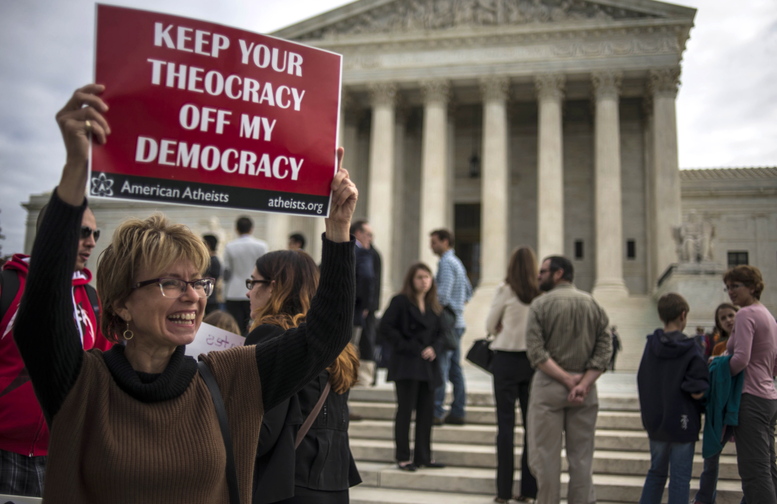WASHINGTON — The Supreme Court on Wednesday struggled with how government can accommodate the nation’s religious history without endorsing beliefs not shared by all, as the justices considered a New York town’s practice of opening its meetings with a prayer.
The court 30 years ago decided that legislatures may open their sessions with a prayer. But Wednesday’s oral arguments considered whether different rules might be needed for a local council meeting, where citizens often come to ask for favors or official action.
A federal appeals court said the town of Greece, N.Y., had improperly identified itself with Christianity through the prayers offered at its meetings over a 10-year period.
As always, Wednesday’s session began with the Supreme Court marshal’s intonation, “God save the United States and this honorable court.”
But Justice Elena Kagan immediately asked Thomas Hungar, representing the town, whether it would have been proper for the chief justice to have asked all in attendance to stand, bow their heads and listen to a prayer that called upon “the saving sacrifice of Jesus Christ on the cross.”
Hungar said he did not think so but that the country had a “different history” about prayers opening legislative sessions. It stretches back to the initial Congress that wrote the First Amendment’s prohibition against establishing a national religion but also its protection of the free exercise of faith, he said.
Both Kagan and Justice Ruth Bader Ginsburg wondered about the difference between legislative bodies such as Congress, where the audience members are spectators, and a town council, where citizens often come to ask for specific action, such as a zoning variance.
Douglas Laycock, a University of Virginia law professor representing two town residents who objected to the prayers, said that was what distinguished the case from the court’s 1983 decision in Marsh v. Chambers – a ruling that Nebraska had not violated the Constitution by employing a Presbyterian minister for 16 years to lead the legislature in prayer.
He said Greece’s practice forced citizens who might not agree with the prayer to either participate against their will or irritate council members from whom they hoped to receive favorable action.
Laycock said the town should be allowed to offer prayers but that those prayers should “stay away from points on which believers disagree.”
Conservatives on the court said that would simply raise more problems, because it could lead to what Justice Anthony Kennedy called “state censorhips.”
Chief Justice John Roberts asked who in government would decide which prayers went too far. Justice Samuel Alito repeatedly asked Laycock for an example of a prayer that would satisfy all in such a religiously diverse country.
The lawyer acknowledged it would be difficult.
Justice Antonin Scalia said there was a competing interest on the side of council members, who want to invoke divine guidance as they “undertake a serious governmental task.”
The justices asked detailed questions about the town practices to which plaintiffs Susan Galloway and Linda Stephens objected.
The council, which previously opened its meetings with a moment of silence, drew its volunteer chaplains from a list of churches in the town. It said anyone would have been welcomed but did not publicize the opportunity. The council neither created rules for the prayers nor screened them beforehand.
All agree that the overwhelming number of prayers over the approximately 10 years covered by the suit were offered by Christians, and most contained direct references to Christianity.
When the case reached the U.S. Court of Appeals for the 2nd Circuit, a unanimous panel of the court said it was not enough to view the town’s actions through the lens of Marsh. Judge Guido Calabresi said the Supreme Court had ruled in a subsequent case involving a creche display that governments must be careful about practices “that have the effect of affiliating the government with any one specific faith or belief.”
Despite what may have been good intentions, Calabresi wrote, that’s what the town of Greece had done. By not reaching out to a more diverse group of prayer-givers or making clear that the prayers did not represent the town’s beliefs, the judges found, “the town’s prayer practice must be viewed as an endorsement of a particular religious viewpoint.”
Copy the Story LinkSend questions/comments to the editors.



Success. Please wait for the page to reload. If the page does not reload within 5 seconds, please refresh the page.
Enter your email and password to access comments.
Hi, to comment on stories you must . This profile is in addition to your subscription and website login.
Already have a commenting profile? .
Invalid username/password.
Please check your email to confirm and complete your registration.
Only subscribers are eligible to post comments. Please subscribe or login first for digital access. Here’s why.
Use the form below to reset your password. When you've submitted your account email, we will send an email with a reset code.